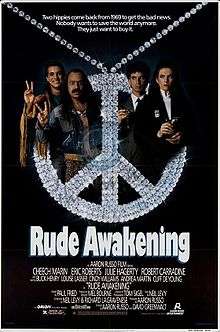Rude Awakening (film)
| Rude Awakening | |
|---|---|
 Theatrical release poster | |
| Directed by |
David Greenwalt Aaron Russo |
| Produced by | Aaron Russo |
| Written by |
Neil Levy Richard LaGravenese |
| Starring | |
| Music by | Jonathan Elias |
| Cinematography | Newton Thomas Sigel |
| Edited by | Paul Fried |
Production company | |
| Distributed by | Orion Pictures |
Release dates |
|
Running time | 100 minutes |
| Country | United States |
| Language | English |
| Box office | $3,169,719 (USA) |
Rude Awakening is a 1989 comedy film directed by David Greenwalt and Aaron Russo.
Plot
In 1969 New York City, two hippies, Fred Wook (Eric Roberts) and Jesus Monteya (Cheech Marin), flee the US to avoid arrest by the FBI and hide out in the jungles of Central America. Fred is an idealist, working on an underground newspaper with his friend Sammy (Robert Carradine), while Jesus is a stoner whose brain has been fried after being given huge amounts of LSD by researchers (the theory being that acid and appropriate visual stimulation can turn pacifist hippies into committed soldiers; Jesus proves their failure by wishing them 'peace' as he leaves the lab.) The two flee the inner-city commune they are living in, leaving behind Sammy who feels it is important that he keep writing and publishing their message, and Fred's girlfriend, artist Petra (Julie Hagerty).
Twenty years later, Fred and Jesus are still living in the jungle, when they find a dying man who has been shot by soldiers. He gives them some documents and tells them it is vital they get the papers back to the US government. The documents imply that the US is planning to invade that very country, and outraged, Fred and Jesus decide to return to the US to get the action stopped. Having been living in isolation (and by implication, stoned the entire time) for the last 20 years, Fred and Jesus return to New York City only to find the 1980s, entrenched in the yuppie ethos, to be something of a shock. Sammy and Petra have both embraced the materialistic culture, and it takes considerable persuasion from Fred and Jesus (including a memorable speech where Jesus makes numerous profound points, ending each one with 'That's all I got to say', before launching into another ramble) before they will agree to help.
Fred, Jesus, Sammy, and Petra join forces to lead a sit-in at the University of New York to protest the planned invasion, which leaves the group despondent; the student body is indifferent and the documents turn out to be a theoretical exercise and not any genuine invasion plans. However, the controversy brought up by their publication implies that Americans would welcome a war 'we can win' and so the invasion actually happens.
Fred is broken by the idea that he started a war, and gives up all hope for the world and human race in general. Fred plans to leave New York with Jesus for places unknown, while Sammy and Petra refuse to come along with them-relunctant to give up their yuppie lifestyle. Just then on the street, some college students show up and ask Fred for his help in mobilising action; they are concerned by the numerous ecological and social problems they see around them and that Fred's sit-down protest at the university inspired them. Fred realizes that despite having failed in his personal mission to prevent war, as long as there are young and idealistic people out there that share his views, there will always be hope for the world.
The film concluded with an onscreen sing-along to the song "Revolution" during the closing credits.
Principal cast
| Actor | Role |
|---|---|
| Cheech Marin | Jesus Monteya |
| Eric Roberts | Fred Wook |
| Julie Hagerty | Petra |
| Robert Carradine | Sammy |
| Cindy Williams | June |
| Tom Sizemore | Ian |
| Andrea Martin | April |
| Rae Dawn Chong | Marlene |
| Louise Lasser | Bonnie |
| Timothy Leary | Diner at Ronnie's |
Critical reception
Rude Awakening received negative reviews from critics. It currently holds a 19% rating on Rotten Tomatoes based on 21 reviews.
Vincent Canby of The New York Times found it endearing but lightweight: "[The film] is hapless but endearing, much like its principal characters... It is not witless, but it has no clearly defined style. It wanders, more or less aimlessly, in the way of a well-meaning, naive flower child."[1]
Roger Ebert of The Chicago Sun-Times gave the film zero out of 4 stars and expressed his dislike of it: "Rude Awakening is such a hapless movie that one is tempted to be charitable toward it, to describe it as a sincere idea gone horribly wrong, rather than as an exercise in idiocy. But kindness is the wrong policy here, I think; the perpetrators of this film should instead be encouraged to seek out entirely new directions for their next work... No one in this movie has an adequate intelligence level. The dialogue of the characters is half-witted, their actions are inexplicable, and to the degree that they possess personalities, they are boring, self-important clods."[2]
References
- ↑ Canby, Vincent (1989-08-16). "''The New York Times'' original review". Movies.nytimes.com. Retrieved 2010-10-06.
- ↑ "Rude Awakening :: rogerebert.com :: Reviews". Rogerebert.suntimes.com. August 16, 1989. Retrieved 2010-08-04.
External links
- Rude Awakening at the Internet Movie Database
- Rude Awakening at AllMovie
- Rude Awakening at Rotten Tomatoes
- Rude Awakening at Box Office Mojo